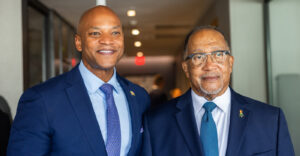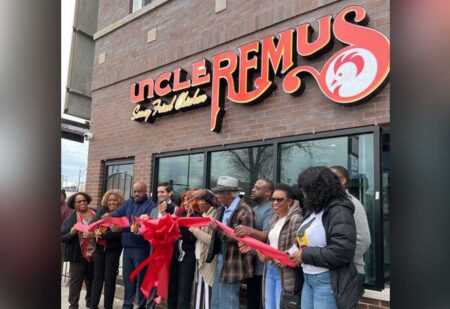The first time Eric McElroy knocked on Zach Jenkins’ door, Jenkins was not in the mood to chat.
At age 25, he had recently been diagnosed with leukemia. While he was still absorbing this, he was on the 15th floor of a Northwestern Memorial Hospital building, preparing to undergo chemotherapy.
Advertisement
McElroy, then 38, was walking the halls with his wife, Jami. Seeing them, Jenkins’ girlfriend, Caileen Calvert, asked him to check in and ask Jenkins to get out of his room. Perhaps they could walk together.
He did knock on the door, and they did walk together, despite Jenkins’ hesitation. Eventually, those door knocks became buoys throughout each of their cancer journeys.
Advertisement
At the moment they met, Jenkins was still reeling from his diagnosis, but McElroy was five years into his journey of learning he had leukemia as a father of three young children.
Over those five years, McElroy had learned a few things. That depression can come with what is many people’s worst-case scenario. How to tell children you’ll be hospitalized for a month. And the importance of moving your body.
“You think you’re alone, and you’re just not,” McElroy said. “What you are is you’re isolated in your room.”
As a fitness coach when he was hospitalized, McElroy made sure to pace the hallways. He got out of his room as often as he felt able to; he was never in bed before 7 p.m. Throughout what often felt like parallel journeys — chemotherapy treatments, checkups, stem-cell transplants — McElroy and Jenkins shared conversations around treatment plans and commiseration around side effects.
One time, they got very sick a week apart, landing again at Northwestern. “I was literally getting wheeled by him,” McElroy recalled. “I was like, ‘Dude, what are you doing?’ It was just like we were set up to definitely walk the journey together.”
In late August, Jenkins returned to Northwestern for a checkup. Nearly a year after a bone marrow transplant for which his sister was the donor, he’s been doing well. He and Dr. Yasmin Abaza, who he hadn’t seen for about a year and since he was much sicker, both shared that they’d been worried since they saw the appointment on their schedules. She had worried he had gotten worse; he feared she was scheduled to deliver bad news.
Instead, she told him his bloodwork looked great and congratulated him on being nearly a year out from the transplant. He is in remission. “I’m very, very happy” said Abaza, who had greeted him with a big hug, calling him “sweetie.”
“That makes me happy,” Jenkins replied.
Advertisement
After the appointment, McElroy met him outside on a sunny Streeterville corner. He too had received positive bloodwork results the day prior. He hopes to be in remission soon. Because McElroy lives in Manteno and Jenkins in Bloomington, they don’t often see each other and they try to meet up downtown surrounding appointments.
Rapport between the two is easy to see, with the pair switching topics from the Cubs and White Sox fandom breakdown within their families to how each of their appointments went last week.
They met last summer. McElroy and his wife had noticed the young man in the hallway, seemingly suffering. The couple had talked about helping him before Calvert suggested the knock on Jenkins’ door.
In June 2021, after going to get a skin issue checked out, Jenkins answered a call from a doctor who told him to come in right away. He knew that couldn’t be good, but didn’t think about the word “cancer.”
“I was still trying to process in my head what was going on and what I faced ahead,” Jenkins said. “At that point, I was really scared.”
In contrast, when McElroy, now 40, began his cancer journey in 2016, he’d had an inkling that word might come up. He noticed a lump on the side of his torso. His sister had been treated for leukemia when she was young; he had a feeling it might be the same diagnosis.
Advertisement
But still, it wasn’t until describing the few symptoms he had — bruising, fatigue, brain fog — to a doctor friend on the phone, who told him he should go in as soon as possible, that he realized the diagnosis might be serious. At the time, he was walking into his daughter’s preschool graduation.
Six years later, that daughter is 11; she and McElroy’s two sons, 9 and 15, know the family motto is, “Be cool.” As in, be calm. Be positive. If you can do that, I can do that. That’s what Jenkins told his wife and kids when he went into the hospital for 28 days of chemotherapy.
Jenkins wears an orange bracelet on his wrist with the phrase from McElroy’s family.
His mother, Toni Jenkins, who accompanied him to the checkup at Northwestern, says it’s a comfort to have McElroy, with his persistent positivity, around her son, who is more likely to worry with every lab result that things could be going wrong.
Even a mother can only help so much. “I can only witness what’s done to him,” she said. “I can’t relate.”
After that initial meeting on the 15th floor, McElroy started inviting Jenkins to walk the halls. Nurses and doctors would see them circling the halls at whatever pace was possible. They’d invite other patients to join what they called a “mobile support group.”
Advertisement
Even after they were discharged, their legacy remains with the clickers nurses added to the walls to help patients track their steps.
Social worker Jennifer Carrera had always wanted to create some type of walking club. As a clinical oncology navigator at Northwestern, helping patients age 15 through 39, she encourages her patients to leave their rooms, to try to meet others who could understand some of what they were going through. Diagnosed at age 25 herself with Hodgkin’s lymphoma, she knows what it’s like to have your world’s corners darkened right when everyone else’s seems to be launching.
“Isolation is huge,” she said. “They may have tons of friends, but the feeling of isolation in that experience is really, really, really difficult.”
Walking has many benefits. It’s exercise that’s often doable even amid treatment; it can help appetite and circulation, mood and sleep.
A few weeks ago, Jenkins saw someone he had met through a support group. The man asked, “Are you the clicker guy?”
“The fact that we were able to have that impact was really special,” he said.
Advertisement
McElroy feels strongly about helping others, that God sometimes places people in your path. And so when he saw in Jenkins a young man who seemed to be struggling, he wanted to reach out to offer consolation, commiseration and simply friendship.
Both want other cancer patients to know that even if they don’t feel like it, talking to others going through a similar situation can help.
Every day, McElroy thanks God for what is ahead of him. It seems like a way to be proactively grateful, to visualize what good may lie ahead. His family jokes that even when it’s pouring rain, he sees a beautiful day.
Recently, the friends returned to the hallway where they met, and saw the clickers on the walls. Although it was McElroy who first stopped in a doorway to knock, he said it was Jenkins who pulled him up when things felt dark.
One time, he was staying in his hospital room. Someone knocked.
“When I opened the door and saw him, I just started crying,” McElroy said. “I could barely contain myself, because OK, now he’s pulling me out of the bed.”
Advertisement






